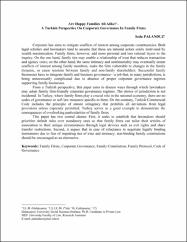Please use this identifier to cite or link to this item:
https://hdl.handle.net/20.500.11779/1442| Title: | Are Happy Families All Alike? - a Turkish Perspective on Corporate Governance in Family Firms |
| Authors: | Palanduz, Seda |
| Keywords: | Family Firms Corporate Governance Family Constitution Family Business Corporate Law Family Protocol |
| Source: | Palandsz, S. (May 7-8, 2020). Are happy families all alike? - A Turkish perspective on corporate governance in family firms. 13th Annual McGill Graduate Law Conference. Canada. |
| Abstract: | Corporate law aims to mitigate conflicts of interest among corporate constituencies. Both legal scholars and lawmakers tend to assume that these are rational actors solely motivated by wealth maximization. Family firms, however, add more personal and less rational layers to the inquiry: On the one hand, family ties may enable a relationship of trust that reduces transaction and agency costs; on the other hand, the same intimacy and sentimentality may eventually create conflicts of interest among family members, make the firm vulnerable to changes in the family dynamic, or cause tensions between family and non-family shareholders. Successful family businesses have to integrate family and business governance—a job that, in many jurisdictions, is being unnecessarily complicated due to absence of proper corporate governance regimes supporting family businesses. From a Turkish perspective, this paper aims to discuss ways through which lawmakers may adopt family firm-friendly corporate governance regimes. The choice of jurisdiction is not incidental. In Turkey, where family firms play a crucial role in the national economy, there are no codes of governance or soft law measures specific to them. On the contrary, Turkish Commercial Code includes the principle of statute stringency that prohibits all deviations from legal provisions unless expressly permitted. Turkey serves as a good example to demonstrate the consequences of overlooking particularities of family firms. This paper has two central claims: First, it seeks to establish that lawmakers should prioritize default rules over mandatory ones so that family firms can tailor their articles of association to their unique circumstances through legal devices such as exit rights and share transfer restrictions. Second, it argues that in case of reluctance to negotiate legally binding instruments due to fear of impairing ties of trust and intimacy, non-binding family constitutions should be encouraged as an alternative. |
| URI: | https://hdl.handle.net/20.500.11779/1442 |
| Appears in Collections: | Hukuk Fakültesi Koleksiyonu |
Files in This Item:
| File | Description | Size | Format | |
|---|---|---|---|---|
| Palanduz - A Turkish Perspective On Corporate Governance In Family Firms (Abstract).pdf | Abstract | 60.75 kB | Adobe PDF |  View/Open |
CORE Recommender
Items in GCRIS Repository are protected by copyright, with all rights reserved, unless otherwise indicated.